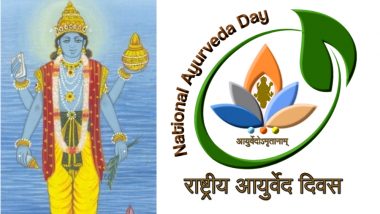Dhanteras, the first day of Diwali celebrations, is dedicated to wealth, health and prosperity. But did you know that the occasion also happens to be called Dhanwantri Jayanti? Lord Dhanwantri, the Indian God of medicines and healing emerged holding a jar of Amrita (nectar of immortality) while the Devas and Asuras churned the ocean of milk (Kshirsagar manthan) on the day that came to be known as Dhanteras. He is regarded as the divine propagator of Ayurveda, one of the world’s most ancient systems of medicines. It’s only befitting to observe National Ayurveda Day on the occasion of Dhanwantri Jayanti. So every year, on Dhanteras day, Ministry of AYUSH observes Ayurveda Day to nationalise the system of medicine.
The logo of National Ayurveda Day draws upon the principles of the holistic Indian system of medicine. There’s a silhouette of Lord Dhanwantri in the centre of the logo, five petals that symbolise the Pancha Mahabhuta (air, water, fire, earth and ether) and three circles that symbolise the doshas (vata, pitta and kapha). The leaf that encircles the elements represents nature. 6 Secrets to Good Health, According To an Ayurvedic Expert.

What is Ayurveda?
Ayurveda is derived from Sanskrit words Ayush (life) and Veda (knowledge. One of the most ancient systems of medicines in the world, Ayurveda also happens to one of the best-documented ones. It originated in the Indian subcontinent more than 3,000 years ago, which combines the use of herbal compounds, diets, meditation and yoga to promote healing.
The holistic system of medicine is driven by an observance of human behaviour, insight and intuition. It believes that “The soil is more important than the seed.” That’s why, Ayurveda places importance on healing the person as a whole instead of the disease alone. Why A Plant-Based, Vegetarian Diet May Be Healthier According to Ayurveda.
Treatment strategies include restoring the balance between the biophysiological forces or dosha and constitution or prakriti.
Why is National Ayurveda Day Celebrated?
In recent years, people have been looking towards holistic medicine to heal chronic health conditions that couldn’t be resolved by modern medicines and surgeries. Ayurveda has been experiencing a revival of sorts. People have been supporting conventional treatment with Ayurvedic medicines on the side.
There’s an increasing demand for Ayurvedic treatment and natural products even from the West. But according to a report in the Journal of Biological & Scientific Opinion by Professor Kumkum Pandey and Professor Ravi Kumar Gupta, a lack of identity, brand equity and marketing mechanisms for Ayurveda in the age of globalisation have been acting as obstacles.
Apart from that, in the absence of standardisation, the use of certain ingredients like heavy metals, etc. cannot be regulated, which makes exporting these medicines difficult.
Globalisation will also help in reducing costs, improving cost and competition of drugs, which makes it a perfect opportunity to revive Ayurveda and to offer the world an alternative to conventional medicine.
What Are The Objectives of National Ayurveda Day?
The objectives of National Ayurveda Day on the day of Dhanteras is to mainstream the ancient system of medicine. It aims to provide the world with an effective alternative to conventional medicine and to spread awareness about its unique treatment principles.
With the support of Ayurveda, the government intends to reduce the burden of disease-related morbidity and mortality. The Ministry of AYUSH also understands the potential of Ayurveda in contributing towards National Health policy and National Health programme. Observing National Ayurveda Day will be a step in this direction.
(The above story first appeared on LatestLY on Nov 05, 2018 01:45 PM IST. For more news and updates on politics, world, sports, entertainment and lifestyle, log on to our website latestly.com).













 Quickly
Quickly


